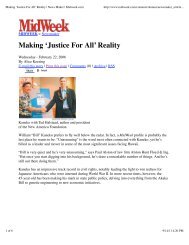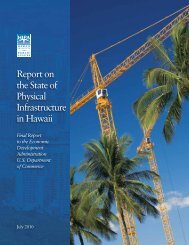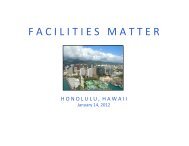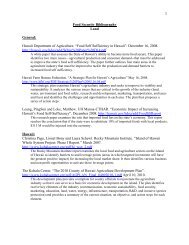Hawai'i Fisheries Initiative - The Hawaii Institute for Public Affairs
Hawai'i Fisheries Initiative - The Hawaii Institute for Public Affairs
Hawai'i Fisheries Initiative - The Hawaii Institute for Public Affairs
You also want an ePaper? Increase the reach of your titles
YUMPU automatically turns print PDFs into web optimized ePapers that Google loves.
Authority within a Nation’s<br />
Exclusive Economic Zone<br />
u Fishing – A nation has an exclusive<br />
right to manage fisheries within its EEZ,<br />
and a preferential right <strong>for</strong> its fishers to<br />
harvest fish in the area. Following the<br />
1982 UNCLOS III, “surplus” fish (beyond<br />
the coastal nation’s ability to harvest) are<br />
to be allocated to <strong>for</strong>eign fishing ef<strong>for</strong>ts.<br />
<strong>The</strong> 1995 U.N. Agreement on Straddling<br />
Fish Stocks and Highly Migratory Species<br />
(those that cross EEZ boundaries into the<br />
high seas and other nations’ EEZs) urges<br />
effective regional organizations and a<br />
precautionary approach (the requirement<br />
that fisheries managers exercise caution<br />
when faced with scientific uncertainty; or,<br />
to err on the side of caution). <strong>The</strong> U.S. was<br />
among the first to ratify the treaty, which<br />
came into <strong>for</strong>ce in 2001. 358 Fishing the high<br />
seas is limited in UNCLOS III by a duty to<br />
conserve living resources and to cooperate<br />
with other nations in doing so. 359<br />
quantities of marine resources, or involves<br />
contact with the continental shelf. 361<br />
u Vessel Navigation and Overflight –<br />
UNCLOS III allows the freedom of surface<br />
and submerged traffic within and overflight<br />
above EEZs. <strong>The</strong> U.S. advocates that this<br />
includes conducting military exercises.<br />
u Protecting the Marine Environment –<br />
Controlling pollution in the EEZ is a right<br />
of coastal nations, limited by the 1982<br />
Convention’s and international custom’s<br />
recognition of freedom to navigate within<br />
EEZs. Significant restrictions exist on<br />
interfering with a <strong>for</strong>eign vessel’s passage,<br />
even <strong>for</strong> pollution reasons. Acting through<br />
bodies such as the International Maritime<br />
Organization, nations are encouraged to<br />
establish uni<strong>for</strong>m rules and standards. 362<br />
u Non-living resources – UNCLOS III<br />
recognizes resources of the seabed, subsoil,<br />
and water column in coastal nations’ EEZs.<br />
<strong>The</strong>re is some overlap between EEZ and<br />
continental shelf law. 360<br />
u Marine Scientific Research – Other<br />
nations may not conduct scientific research<br />
within the EEZ without obtaining the<br />
coastal nation’s consent; such consent is<br />
expected to be given in “normal circumstances.”<br />
<strong>The</strong> U.S. requires advance consent<br />
<strong>for</strong> marine research if conducted within the<br />
territorial sea, or if the research involves<br />
marine mammals, taking commercial<br />
76







